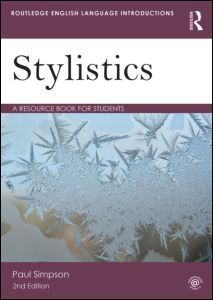Description
Stylistics (2nd Ed.)
A Resource Book for Students
Routledge English Language Introductions Series
Author: Simpson Paul
Language: English
Subject for Stylistics:
Keywords
Stylistics; Paul Simpson; corpus analysis; corpora; literary stylistics; RELI; Routledge; readings
Approximative price 50.12 €
In Print (Delivery period: 14 days).
Add to cartPublication date: 01-2014
Support: Print on demand
Publication date: 01-2014
Support: Print on demand
Description
/li>Contents
/li>Readership
/li>Biography
/li>
Assuming no prior knowledge, books in the series offer an accessible overview of the subject, with activities, study questions, sample analyses, commentaries and key readings ? all in the same volume. The innovative and flexible ?two-dimensional? structure is built around four sections ? introduction, development, exploration and extension ? which offer self-contained stages for study. Each topic can be read across these sections, enabling the reader to build gradually on the knowledge gained.
Written in a clear and accessible style, Stylistics, Second Edition is a comprehensive resource which covers all the major theories, concepts and methods required for the investigation of language in literature. From metre to metaphor, dialogue to discourse, the main topics are introduced and fully elaborated, as are the key research paradigms of this important and exciting field of study. Stylistics is richly illustrated with many examples from literary texts, including writing from the established literary canon alongside more contemporary work in poetry, prose and drama. Each of the book?s twelve chapters contains clearly framed suggestions for practical work and is accompanied by an original reading on the relevant topic by a world-renowned scholar.
This exciting new second edition builds on the strengths of the first by adding many fresh exercises and worked examples. It captures the latest major developments in stylistics, such as corpus, cognitive and multimodal approaches to the study of style, and its accompanying website has also been substantially revised to feature, amongst other things, useful links, worked examples and a new web strand on style and humour. In addition to the classic readings in stylistics contained in the first edition, the new edition includes a number of recent, stimulating readings by key figures in the contemporary field. Written by an experienced teacher and researcher, this accessible textbook is an essential resource for all students of English language, linguistics and literature.
A - Introduction: key concepts in stylistics
1 What is stylistics?
2 Stylistics and levels of language
3 Grammar and style
4 Rhythm and metre
5 Narrative stylistics
6 Style as choice
7 Style and point of view
8 Representing speech and thought
9 Dialogue and discourse
10 Cognitive stylistics
11 Metaphor and metonymy
12 New directions in stylistics: corpus approaches
B - Development: doing stylistics
1 Developments in stylistics.
2 Levels of language at work: an example from poetry
3 Sentence styles: development and illustration
4 Interpreting patterns of sound
5 Developments in structural narratology
6 Style and transitivity
7 Approaches to point of view
8 Techniques of speech and thought presentation
9 Dialogue in drama
10 Developments in cognitive stylistics
11 Styles of metaphor
12Developments in corpus stylistics
C - Exploration: investigating style
1 Is there a "literary language"?
2 Style, register and dialect
3 Grammar and genre: a short study in Imagism
4 Styles in a single poem: an exploration
5 A sociolinguistic model of narrative
6 Transitivity, characterisation and literary genre
7 Exploring point of view in narrative fiction
8 A workshop on speech and thought presentation
9 Exploring dialogue
10 Cognitive stylistics at work
11 Exploring metaphors in different kinds of texts
12 Using corpora in stylistic analysis
D- Extension: readings in stylistics.
1 Stylistics and the teaching of literature (Henry Widdowson)
2 Style and verbal play (Katie Wales)
3 Teaching grammar and style (Ronald Carter)
4 Sound, style and onomatopoeia (Derek Attridge)
5 A typology of narrative gaps (Donald Hardy)
6 Transitivity at work (Deirdre Burton)
7 Style variation and point of view (Mick Short)
8 The effects of free indirect discourse (Joe Bray)
9 Multi-modal analysis and the stylistics of drama (Dan McIntyre)
10 Conceptual blending and stylistic analysis (Barbara Dancygier)
11 Cognitive stylistics and the theory of metaphor (Peter Stockwell)
12 Corpus stylistics (Michaela Mahlberg and Catherine Smith)
Paul Simpson is a Professor of English Language in the School of English at Queen’s University Belfast. He is best known for his books and articles in stylistics and critical linguistics and his publications in this area include Language, Ideology and Point of View, Language through Literature and the co-authored textbook Language and Power, all published by Routledge. He is the author of the monograph On the Discourse of Satire and from 2003 to 2009 was editor of Language and Literature, the journal of the International Poetics and Linguistics Association. He is currently writing a monograph on the linguistic pragmatics of irony.
These books may interest you

The Routledge Handbook of Stylistics 281.07 €



